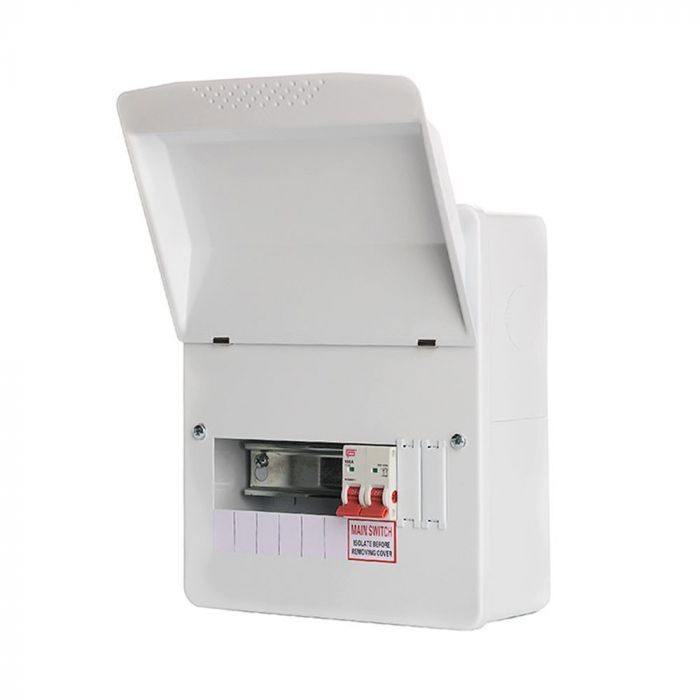The Role of Consumer Systems in Reliable Power Management Systems
Customer devices are indispensable to reliable power administration systems, offering as the key distribution factors for electrical power within frameworks. The development of smart technologies has additionally improved their functionality, allowing for real-time information tracking and nuanced power intake evaluation.
Comprehending Consumer Units

Understanding the function of customer systems begins with identifying their necessary function in guarding electrical systems. By separating faults within certain circuits, consumer units avoid widespread interruptions and prospective fire hazards. This isolation is attained with the use of circuit breakers that trip or integrates that blow when a mistake is detected, consequently removing the electric flow to the impacted circuit.
Furthermore, consumer units promote the well organized circulation of power, improving the efficiency of power usage. They permit the organized management of electrical lots, which can be especially essential in industrial and commercial setups where demand can fluctuate substantially. Appropriately maintained consumer systems add to the longevity of electrical systems and aid in decreasing downtime triggered by electrical failings, ultimately sustaining the smooth procedure of energy-dependent centers.
Smart Technologies Combination

A crucial benefit of wise consumer systems is their ability to utilize advanced formulas and maker discovering for anticipating analytics. This permits for preemptive changes based upon usage patterns, climate forecasts, and other variables, significantly increasing overall effectiveness. Smart customer systems promote demand reaction programs, where energy usage can be dynamically readjusted during height periods to support the grid and reduce prices.
The assimilation of renewable resource sources, such as solar and wind, is likewise structured via wise consumer systems. By wisely taking care of the intermittency of these sources, these systems make certain a balanced and trustworthy power supply. Additionally, smart customer devices improve individual involvement by giving comprehensive understandings and remote control capacities via mobile applications, cultivating a more proactive method to energy conservation and sustainability.
Monitoring Energy Usage
Structure on the abilities of wise technologies assimilation, monitoring energy usage ends up being a crucial focus within power administration systems. Reliable surveillance offers as the foundation for determining power inefficiencies and applying rehabilitative actions. By leveraging sophisticated metering framework (AMI), real-time information on power use can be gathered at granular levels, giving beneficial understandings right into usage patterns and peak need durations. This data-centric method enables both customers and power supervisors to make enlightened decisions focused on minimizing waste and enhancing total effectiveness.
Smart meters and Web of Things (IoT) gadgets play an essential duty in this surveillance procedure. These tools can track power use in real-time, transmitting data to central systems for analysis. The gathered information is then processed through innovative formulas to identify abnormalities, predict future usage, and recommend optimization methods. In addition, cloud-based remedies provide scalable systems for storing and assessing huge datasets, assisting in remote tracking and control.
The combination of these technologies not just equips customers with detailed info concerning their energy use however likewise sustains utility carriers in taking care of lots circulation better. Eventually, precise and continual monitoring is important for attaining energy performance, expense financial savings, and sustainability goals within energy administration systems.
Optimizing Appliance Usage

One effective approach involves recognizing optimal and off-peak hours to shift energy-intensive activities, such as washing or dishwashing, to times when energy demand is reduced. This not only decreases stress on the grid however additionally takes advantage of reduced power tolls. In internet addition, integrating machine discovering algorithms allows for predictive maintenance, ensuring devices operate at ideal performance and prolonging their life-span.
Energy monitoring systems can additionally incorporate user-specific choices and actions to customize appliance use timetables. Wise illumination systems can change brightness based on occupancy and natural light availability, while Heating and cooling systems can preserve comfort degrees without excessive power usage.
Promoting Sustainability
Promoting sustainability within energy monitoring systems entails not only improving efficiency however likewise promoting environmentally responsible methods. Customer systems are essential to this process, as they offer real-time information and control devices that make it possible for customers to check and minimize their power intake. By leveraging advanced innovations, customer units can determine energy-saving possibilities and facilitate the integration of renewable energy resources like solar and wind power.
One essential facet of promoting sustainability is enlightening customers try this site on the advantages of liable power usage. With in-depth insights supplied by consumer units, individuals can make educated decisions that reduce their carbon footprint. These units can suggest optimal times for operating high-energy devices based on grid demand and eco-friendly power accessibility, thus decreasing dependence on fossil gas.
Additionally, customer devices support the fostering of smart grid innovations, which enhance the general effectiveness and reliability of power circulation. By making it possible for two-way communication in between consumers and energy providers, these systems can dynamically adapt to energy demands, lowering waste and advertising making use of lasting energy practices.
Conclusion
Customer devices, as indispensable components of power management systems, significantly boost electric safety and effectiveness within buildings through circuit security and smart innovation combination. Real-time information surveillance and analysis facilitated by these systems optimize power usage and device use. Furthermore, the unification of eco-friendly power resources promotes sustainable methods, adding to lowered overall power intake and lower carbon impacts. Customer devices play a critical duty in progressing both power efficiency and ecological sustainability.
Developments in smart technologies have reinvented the abilities of power administration systems, specifically through the assimilation of smart consumer devices.Structure visit on the abilities of clever modern technologies integration, keeping track of power consumption ends up being a critical emphasis within energy management systems.Effective home appliance usage optimization is an essential component of power management systems, intending to enhance efficiency and lower unneeded energy consumption.Customer units, as important parts of power monitoring systems, considerably improve electric security and performance within buildings via circuit protection and smart modern technology integration. In addition, the incorporation of renewable power resources promotes lasting methods, contributing to decreased general power consumption and reduced carbon footprints.